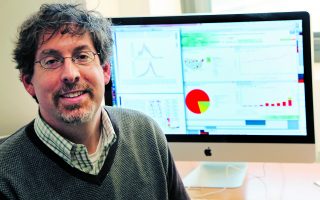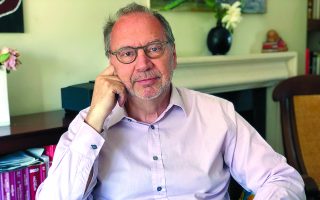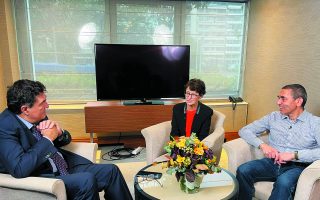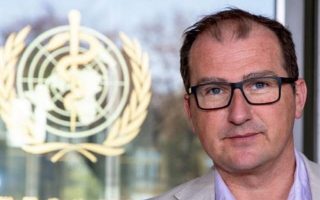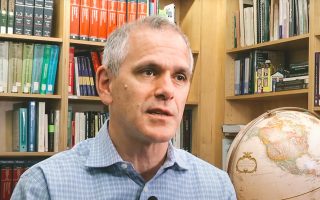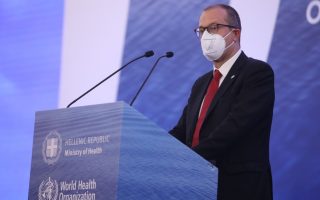Pfizer working ‘very intensively’ on annual shot
CEO of US pharmaceutical giant talks about scientific community’s battle against the pandemic and what has changed today
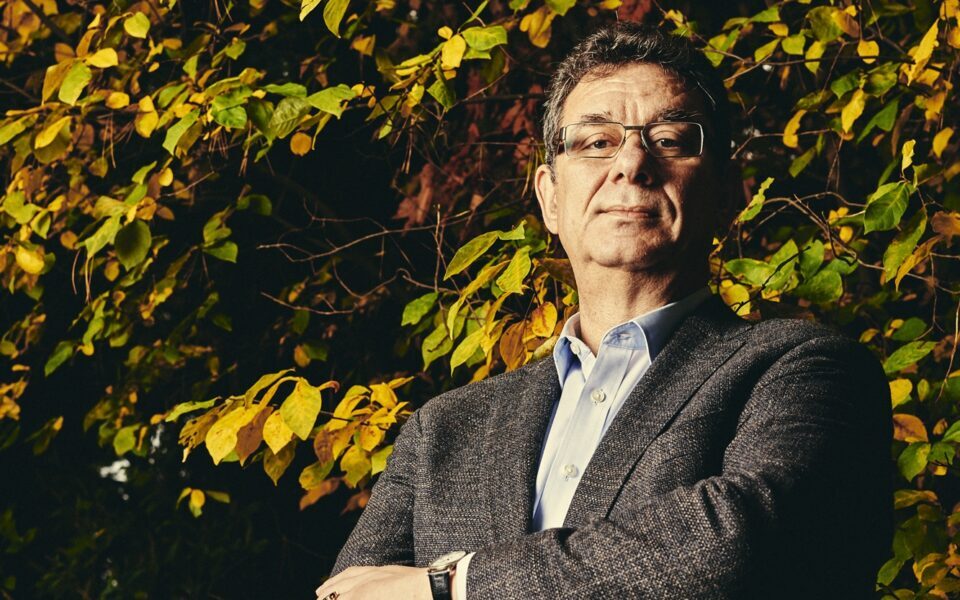
A vaccine that will cover all the known variants of the SARS-CoV-2 virus is just days away from being given the green light at Pfizer, the CEO of the American pharmaceutical company, Albert Bourla, tells Kathimerini.
“From the moment that the data become clear and create no doubts, we will move to production very quickly,” he says, adding that the next big step will be developing an annual vaccine against Covid-19.
Bourla also explains why booster shots are essential and appears fairly confident that by next winter, the situation will be more or less back to normal.
Talking about the race to respond to the outbreak of the pandemic in 2020, which he describes in his recent book “Moonshot,” Bourla reveals that the production of a vaccine very nearly failed on several occasions, and also explains why Pfizer chose Israel for the first round of mass vaccinations in a bid to study herd immunity.
He also expresses his delight at the success of Pfizer’s investment in his native city of Thessaloniki, in northern Greece.
In your book you describe Pfizer’s achievement of creating the Covid-19 vaccine in eight months as the “great leap.” Of course the research and technology that was relevant to the final result was already in place, was it not?
In research you never start from scratch. There is the work of millions of worthy scientists. In mRNA technology, although it is very recent, there is at least 20 years of intensive research in many sectors. At Pfizer we started working on it five years before the vaccine, back in 2015. In 2018 we made a deal with BioNTech, which was our partner during the pandemic, to create a flu vaccine using mRNA technology. That is why in 2020, when we reached out to scientists with the goal of creating a Covid vaccine, they recommended this technology. Initially I was surprised by the proposal. I was hesitant because up until then no vaccines or medicines of that technology had gone on the market. However, it was exactly because they had been working with us since 2018 that they felt confident that it had matured and could immediately produce a vaccine. So there was years of work behind it.
Is that why a vaccine was made possible in such a short time period?
That is not exactly it, because in other cases in which there was knowledge beforehand we took 10 years to produce vaccines, not eight months. The main reason was that we were experiencing unprecedented moments. Civilization as we knew it was in danger and that made us all work very differently, knowing full well that the stakes were not the success of a drug or a company. The stakes were saving the world.
Were there moments when you doubted the success of the enterprise? What was the most difficult moment you faced on this journey?
On such a complicated program on which thousands of people work in individual sectors you get news every day: good news and bad news. There were many moments when the problems scared me and I thought that we would not overcome them. And I would think of the consequences if we did not overcome them. For example, we were near the end of the results, when suddenly we realized that we had a problem in production. More specifically, we couldn’t scale up, namely increase production to the point required. We continuously got a signal that there was something wrong in the way in which we were creating our compounds when going from the micro to the macro. It wasn’t about the safety or the effectiveness of the vaccine. But it was critical. It would have been the death of the program if we couldn’t run it on an industrial scale. We faced many such cases.
The efforts to produce the vaccine coincided with a period of political polarization in the USA. You mention a politicization of the pandemic and the vaccine in your book. What was cooperating with Donald Trump like? Would you share some moments from that period?
It is true. In many parts of the world, but especially in America, where we had the presidential election campaign period, things were very polarized. We got to the point where wearing a mask or getting a vaccine was a political statement. Look, President Trump believed that the best solution for him before the elections was for a vaccine to come out that he could claim was the result of his own moves. He had made it very clear. He said that he would get a vaccine out before the elections. “There’s something great coming before the elections,” he used to say. In that context he contacted me several times. I had a friendly relationship with the government and the opposition during that period. I believed that it was my obligation to inform both sides on how things were progressing. That is why I was often in contact with Trump and Biden. When the vaccine arrived after the elections, instead of before, he was very disappointed. He got angry. In a way, he believed that I could have brought it before the elections and that I didn’t do so because I didn’t want to. And that made him bitter. We have not spoken since.
How did you decide that Israel would be the country where the first mass vaccinations would take place in order to draw the first statistics for the scientific community?
We were looking for a country where we could see in practice the results of so-called herd immunity. A country where we could have mass vaccinations very quickly, in order to send the message that there is hope and that people should not worry. Because we knew that it would take years to get it all over the world. We were looking at countries that were relatively small in order to do this. Israel was one of them. There were others, such as Denmark and Greece. Israel, however, also has other characteristics. It had closed borders, in contrast to European countries where people from other European countries can travel. It would also be complicated to make an exception for an EU country where member-states all secure their vaccines together. Furthermore, Israel has almost 100% electronic data on its patients, going back up to 30 years, a fact that gave us the opportunity to do exceptional quality research. Furthermore, Israel is a country that, due to the conflict in the region, knows how to deal with a crisis. So I knew that we could do it very quickly, because in Israel they are very good at organizing things.
Was it difficult to distribute the vaccines at the beginning? Did you find yourself in a dilemma as to which countries would have priority?
I found myself in the difficult position of having to explain to many people why we didn’t have vaccines. There were no dilemmas, because we followed a transparent procedure. We went to all the countries in the world very early on and asked them to place orders, highlighting the differentiation in prices. There was a different price in Europe, in the USA, and in Japan, namely, rich countries. There was a different price in medium income countries, which paid half. And there was a different price for very poor countries, where we made the vaccine available at cost. As the orders came in, we committed the corresponding quantities. When someone changed their mind regarding quantities after the fact, they had to go to the end of the line, not the beginning, as others had already paid. But that was all over in six months. In the second half of the year we had vaccines for everyone. And unfortunately, right now, the US government has purchased 800 million doses at cost to make them available to Africa and it cannot go through with it because in Africa they are facing other problems. There are more people who do not want the vaccine, deniers, in comparison to corresponding percentages in countries with higher incomes and education levels. Furthermore, they do not have the infrastructure or the people to carry out the vaccinations. These are issues we should have focused on more before rushing to send them vaccines.
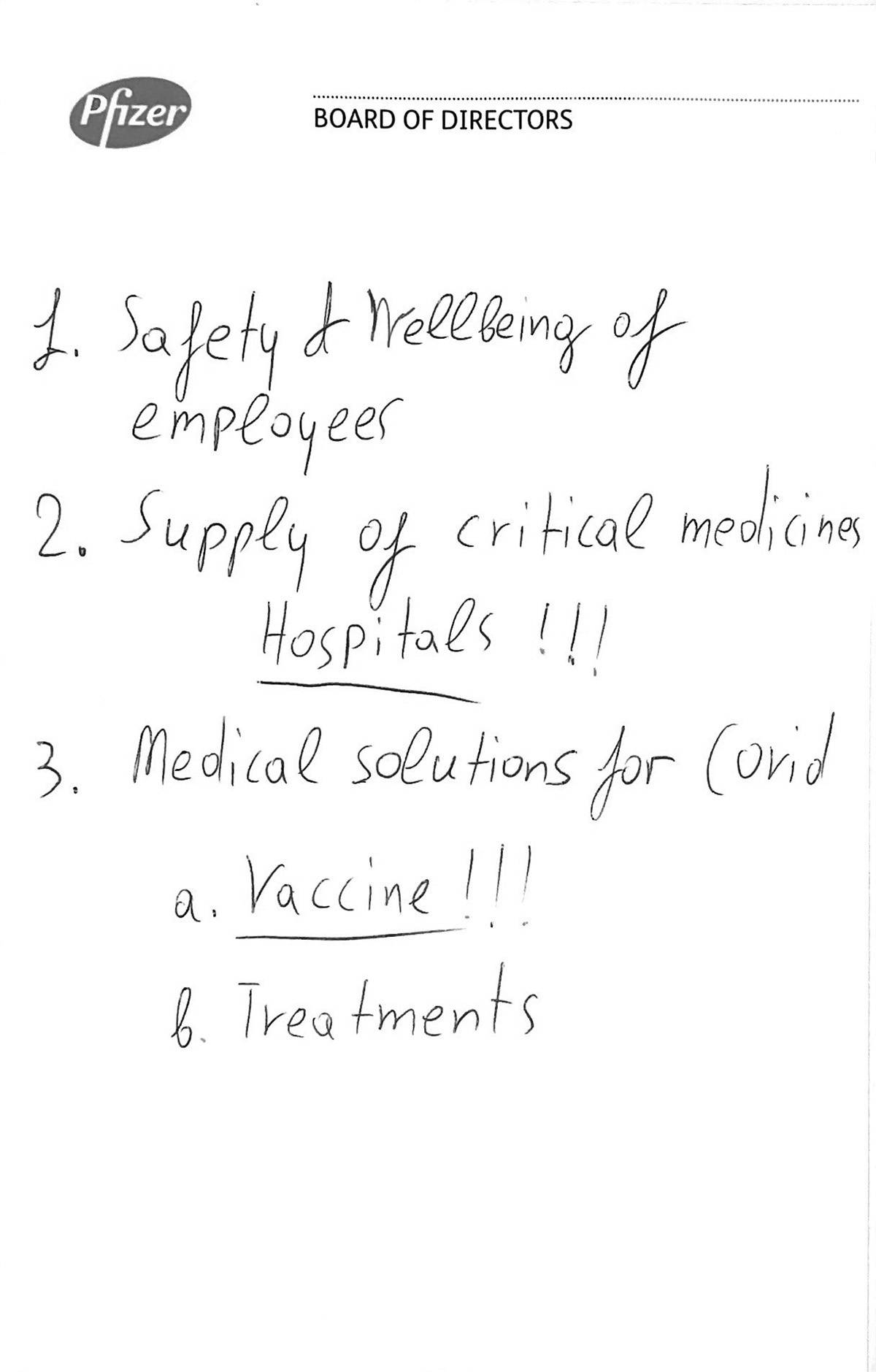
New vaccine, more treatments
When will the version of the Pfizer vaccine that will cover all mutations be ready?
Soon, I hope. We are waiting for some major research to be completed. It is a matter of days until we see if we have something and what it is. Are we moving to a new vaccine? Are we staying with the old one? Will we have a double vaccine – namely, the old one and the new one? From the moment that the data become clear and create no doubts, we will move to production very quickly.
Would it be a realistic target to make it in time for next winter?
That is a very realistic target. We are discussing having it sooner.
And will we now have an annual vaccination or are we staying with booster shots?
We need an annual vaccine and we are working on that. Booster shots tire people and reduce the level of compliance. Currently, in an Omicron environment, it is certain that the immunity from the current vaccine will not last for a year, even after the fourth shot. But there is no certainty for the new vaccine, which will cover all variants. But we know what we can do to create an annual vaccine. And we are working on it very intensively.
Certain people in Greece seem reluctant when faced with the third and fourth booster shots, as they believe that the vaccine does not adequately cover the Omicron variant, and therefore it makes no sense for them to get vaccinated at the moment. What is your opinion?
They are mistaken. It is no accident that all the authorities in all countries definitely recommend the third shot. And many countries recommend the fourth shot too. The reason for this is because they know that there is an enormous difference between those who get booster shots and those who don’t. The numbers of those who fall badly ill and die are enormous in the latter category. The third shot is definitely necessary, because if you fall ill, you might fall very ill. And if it has been a long time since you had the third shot, you need the fourth shot, because your immunity is weakening.
How different do you expect next winter will be? Will we be closer to what we remember as normal? For many, getting rid of masks will be a characteristic milestone.
Yes, we will be. It’s not just the vaccines or the fact that people are tired and therefore we have no choice. The reason is that now there are treatments that concern more than just the final stages, namely, very ill patients. We now have treatments for everyone. If you fall ill with Covid now, you can take a pill and avoid hospitalization, and only one in 10 of those being hospitalized currently will need to go. It is an enormous difference and it will greatly reduce the severity of the symptoms, hospitalizations, and deaths.
On the one hand, the vaccine required brave investments. On the other, the prospects for income are not to be ignored in the least. In financial terms, what does this whole story mean for Pfizer?
Indeed, we spent a lot of money and at great risk. However, things worked, and they worked twice, with the vaccine and the medicine. Right now we have the lion’s share of the market, as most people prefer the Pfizer vaccine. We have 80% of demand in Europe and 75% worldwide, and the rest of the vaccines together hold the remaining 25%. Therefore, the review is very beneficial, on a financial level also, for our company.
How is the Pfizer investment in Thessaloniki moving along?
Exceptionally and I am excited. We created the center, we staffed it with exceptional scientists – we couldn’t believe what we were seeing, how many excellent scientists expressed an interest – and now we are seeing incredible work with tangible results being produced, right now, in Thessaloniki. Intellectual property of incredible value and of an excellent level on many international projects, also including Covid. That was also a wager. I was certain of its success, because I knew the people. I just had to convince everyone else at Pfizer, who didn’t even know of Thessaloniki. That is why I am truly happy about how things are going.
What conclusions, if any, have you drawn from this entire experience on a leadership and management level?
The main conclusion is not something I necessarily learnt now, but which was impressively confirmed for me: People never know what they can achieve. They have a tendency to believe that certain things are unachievable and they exaggerate their pessimism in the face of adversity. If you set a goal and say that you will not stray from it, that you will continuously try to find ways to achieve it, then you will be impressed with what you can achieve.
Do you feel more American or Greek? And to make the question more specific, will you continue your career in the USA or is there a chance we might see you in Athens, if not in Thessaloniki?
I feel more Greek. When you grow up in a country and when your family and friends are there, when you learned the music you listen to there, then that is where you feel you belong. When they ask me similar things in America, I tell them that I am Greek by birth and American by choice. My heart is in Greece. But as to whether I will return to Greece for professional reasons, I don’t think so. And I believe that my children will also choose to stay in the USA, also for professional reasons, and therefore we will want to be where our children are. I think that I will spend half my time in America and the other half in Greece.
